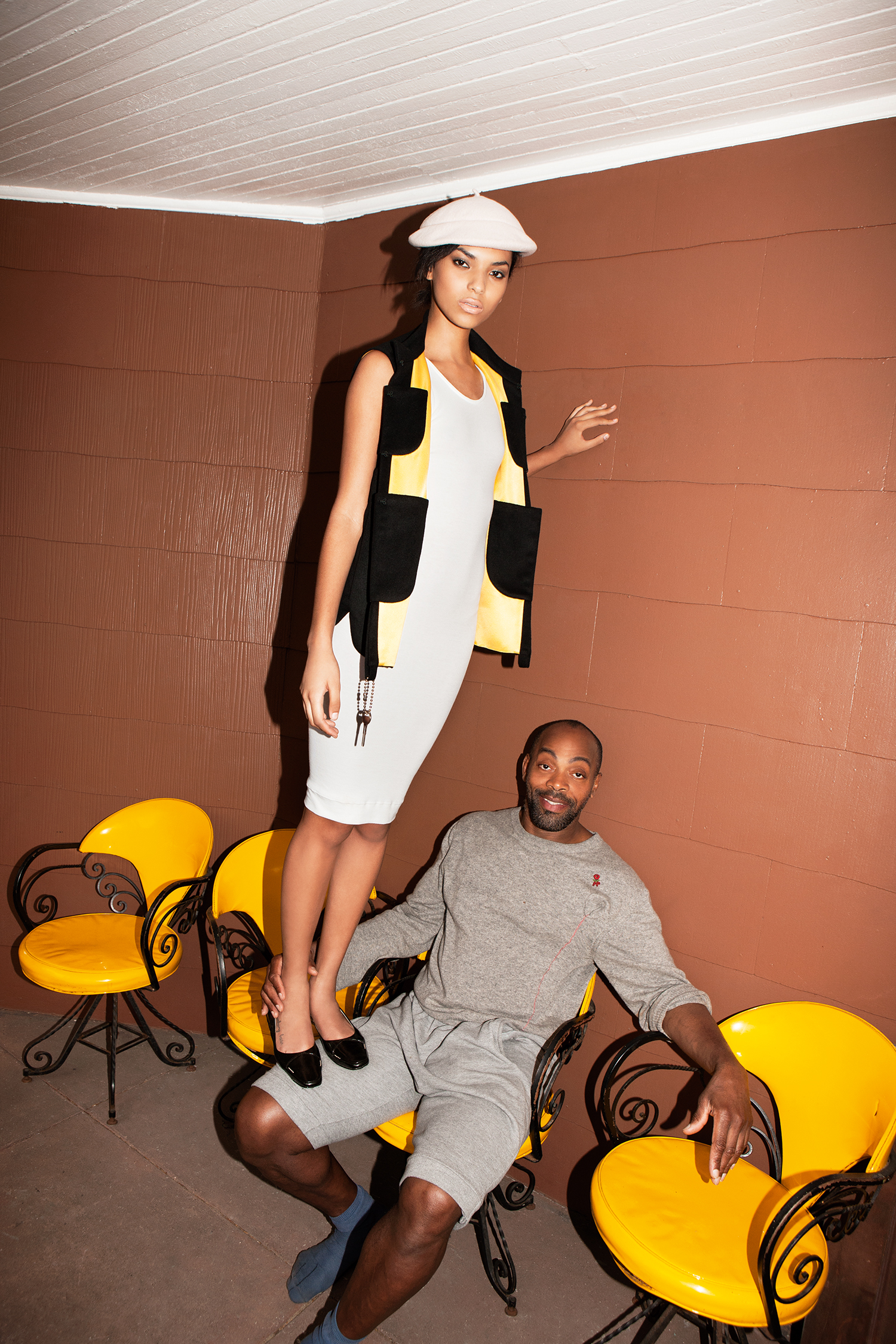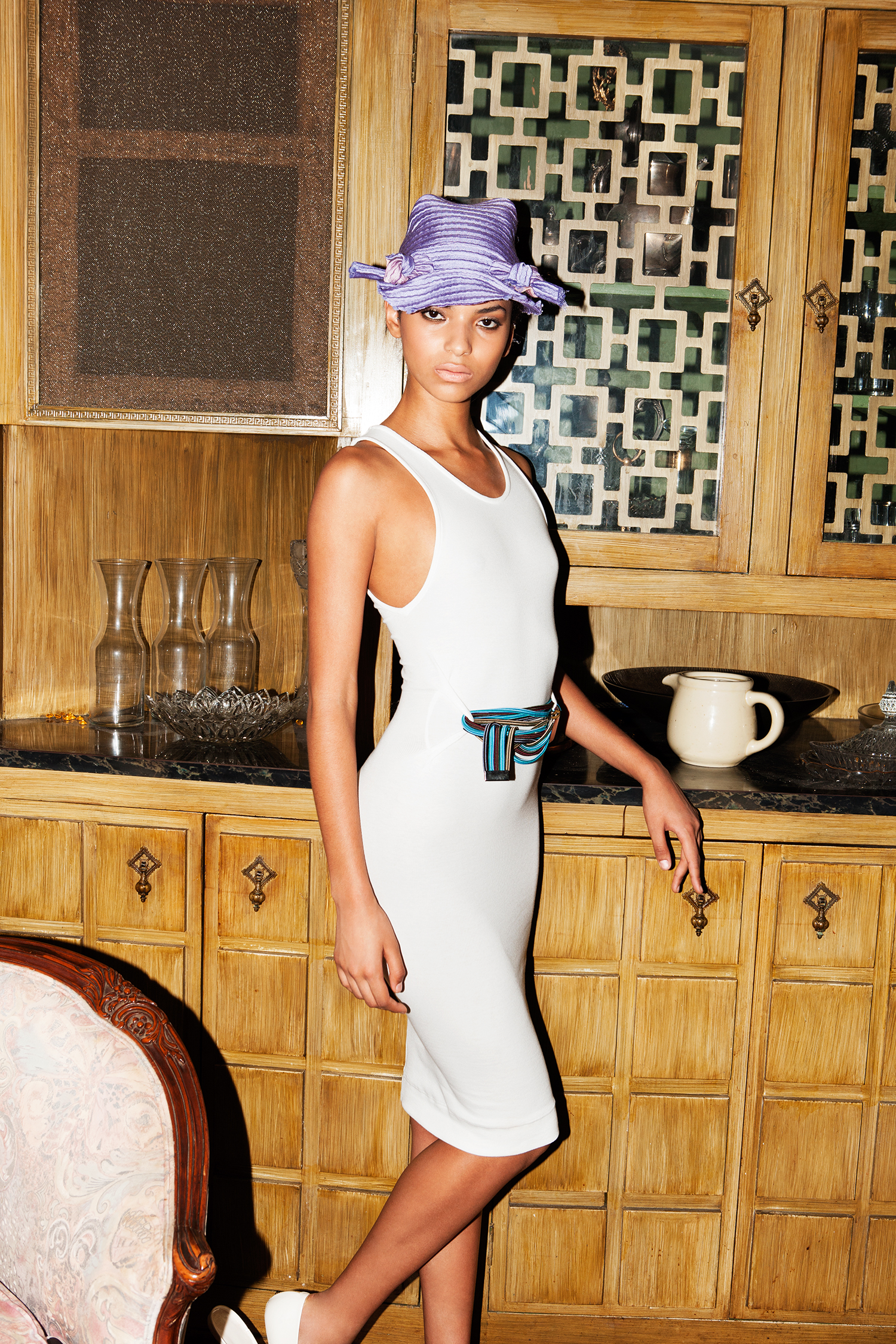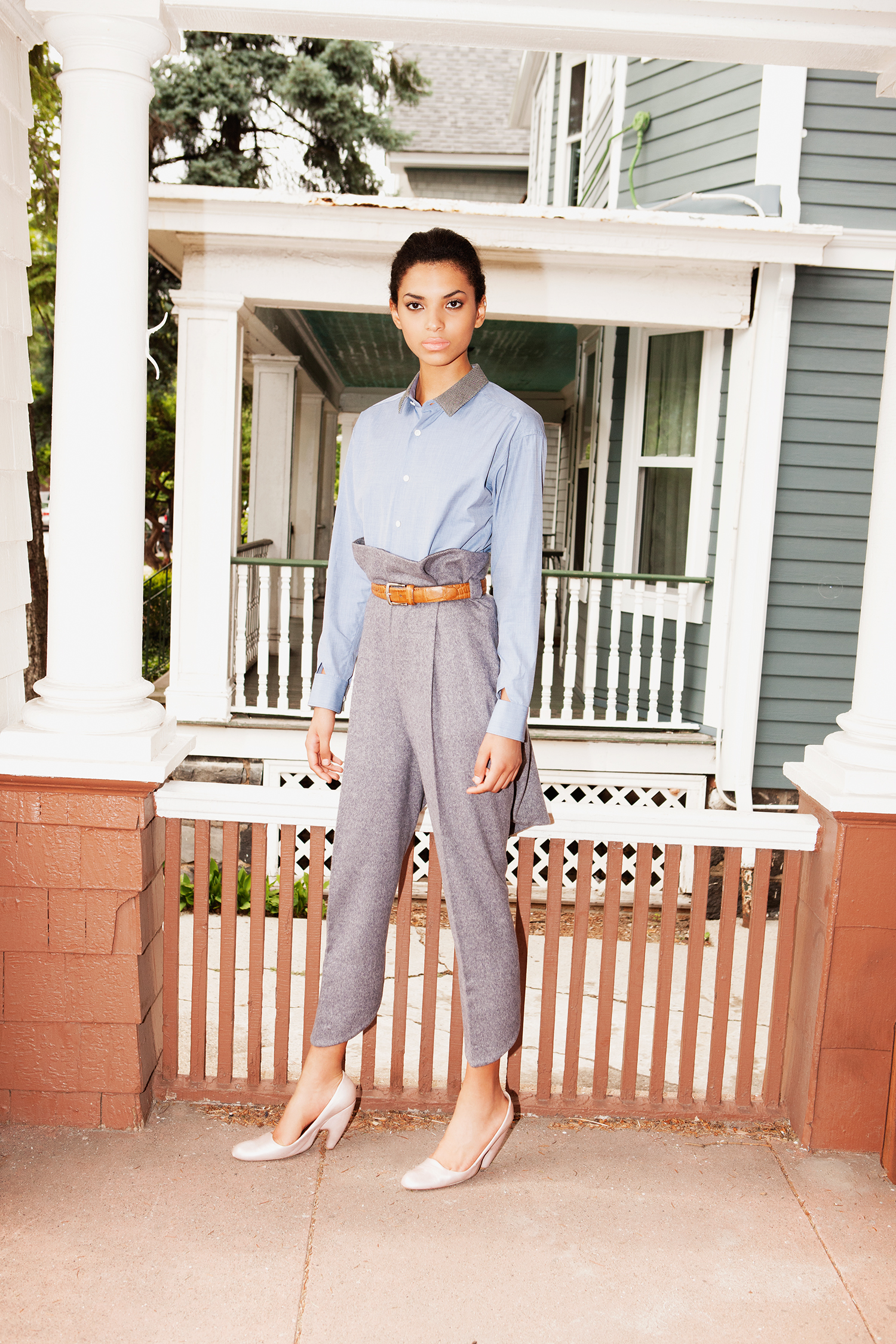Purple Magazine
— F/W 2014 issue 22
Andre Walker
 A cashmere utility vest over a cotton tank dress, patent pumps, and a pink wool beret AND RE WALKER
A cashmere utility vest over a cotton tank dress, patent pumps, and a pink wool beret AND RE WALKER
comeback at Dover Street Market, New York
interview by OLIVIER ZAHM
And Re Walker new collection
photographed by MARCELO KRASILCIC
style by MASHA ORLOV
OLIVIER ZAHM — How does it feel to design your own collection after so many years?
ANDRE WALKER — the last collection i did was at the Centre Pompidou in March 2001. So it’s officially been 13 years since i stopped designing for myself. it was the same year that the world trade Center came down, and by coincidence the invitation card had a picture of the building on it! i was still hanging on in paris until 2005 and finally came back to New York to work for Marc jacobs. then Comme des garçons asked me to be part of the Dover street Market NY, and i’m starting again!
OLIVIER ZAHM — So tell me about this new collection. How did you find inspiration, and what pushed you to come back with your own line under your name?
ANDRE WALKER — I changed the configuration of “Andre.” It’s just the first three letters A-N-D, and then the R-E, and then walker: and re walker. i just like the way it looks visually, and i got off on the idea phonetically. i just love the idea that the re was like rei without the “i.” it felt like a special project. i wasn’t sure how long it would last so i figured, why not just do it this way? Just keep everything spontaneous. that’s just the way i think, the way my creativity enjoys its fluidity. anyway, I couldn’t care less about my name. what is important is the work that i’m doing.
OLIVIER ZAHM — Is it true that you reinterpreted some of your older pieces?
ANDRE WALKER — Yeah, absolutely. i think what’s so special about some of the old pieces i’ve done is that they were never produced, and they never had patterns made for them, like pieces i was making when i was 15, 16, 17, 18… i would simply put the fabric on the floor, and i would cut it and then eventually pin it together and sew it.
OLIVIER ZAHM — Did you recreate them from memory or do you have personal archives?
ANDRE WALKER — i’ve got my sketchbooks and old photos. then last year, roxanne lowit unearthed an archive of 175 pictures.
 A short-sleeved cotton dress with webbed belts AND RE WALKER
A short-sleeved cotton dress with webbed belts AND RE WALKER
OLIVIER ZAHM — Are you working on a book?
ANDRE WALKER — Yeah. I really love the idea of making a book because a lot of these things have never been seen. Like, you know Andy Warhol, Jean-Michel Basquiat, Stephen Sprouse, all of these people who were such a huge part of the folklore of the 1980s in New York City — they were so well documented. Yet I feel like my presence is much more mythical. But for the moment, I haven’t started working on it. i’m just collecting the archives. I also found a lot of drawings from childhood, from school days, when i would interrupt my physics and mathematics classes with designs, of course. They’re endless. I’ve got a ton of pictures. So, you know, a large part of my career has been played out in the press, yet there wasn’t a lot of pictorial information to go along with the kind of attention i’ve received as an underground designer or whatever they call me — or, called me.
OLIVIER ZAHM — For the fashion insider, you’re a legend.
ANDRE WALKER — Well, I have no idea. I refer to myself as an anomaly rather than a fashion enigma or legend, because it’s just such a strange path.
OLIVIER ZAHM — When I started Purple in ’92, I asked my friends about designers in New York, and you were the first name to come up. And we did a little piece, I don’t know if you remember.
ANDRE WALKER — You guys at Purple have been so incredible to me, even when I didn’t have any stores. You were like, who cares? Get that coat in the bloody picture!
OLIVIER ZAHM — You think you’re an anomaly?
ANDRE WALKER — Oui, absolument.
OLIVIER ZAHM — You incarnate a true love for fashion and style, as well as a connection to the art community. So people call you a fashion-artist, right?
ANDRE WALKER — I don’t know what it means exactly. What is an artist, anyway? That’s my biggest problem: I’m evasive about everything. And it’s because i don’t want to be locked down. It’s been 12 years of not designing my own collection. I’m always trying to escape the categorization or the “miniaturizing” of the frame or scope of the way the work can be viewed. But it’s true that I approach fashion in a very free, very personal way.
 A silk dress and leather heels AND RE WALKER
A silk dress and leather heels AND RE WALKER
OLIVIER ZAHM — Your shows have always been like a party. Very exciting. People liked that because it’s not that you didn’t take fashion seriously — you took fashion very seriously — but I remember the fun.
ANDRE WALKER — Oh, the Purple Institute show! Oh, God! That show was beautiful, wasn’t it? It was so good! And it’s not because it was my show; it was because it was a good show. The people that came together for that show, the models, the people that helped out, the music, the pot smoking, the talking with friends, and recording music together. That’s what I love about fashion.
OLIVIER ZAHM — What don’t you like about fashion today?
ANDRE WALKER — Now, I try not to use the word “fashion” anymore, because I’m such a snob. You know what I mean? I promise you, that’s not being pretentious. I just can’t hear that word anymore because it’s being misused by so many people, and it’s just like, well, who are you? Don’t say that you like fashion, please. Because I can’t take you right now! It’s, like, everybody loves fashion. I remember I hired a girl once because she said she loved fashion. She didn’t know anything about anything! If you say you love fashion, I want to know names! [laughs]
OLIVIER ZAHM — Is this why you decided to create a magazine?
ANDRE WALKER — TIWIMUTA. The reason I made This is What it Made us Think About was because i was working a lot with Marc jacobs. it was like my sixth season with him, and i really wanted to have a place to put things for myself. For every collection, I would make my own books, and sometimes I would put fabrics in them, and the whole thing just kind of imploded on me; it dawned on me, like, “Oh my gosh, I want to make a magazine.” There was Purple, there was Self Service, there was Another. There were a few at the time; there were far fewer magazines in 2007, 2008, right?
OLIVIER ZAHM — You have biannual fashion magazines but no yearly publication made by a designer.
ANDRE WALKER — I wanted to make the first yearly publication because I have to be first! Mine would have 50 types of paper! That thing took me two-and-a-half years to make, and it was such a headache. When the thing was finally finished, the pages couldn’t even open, it was so heavy. It just wouldn’t move! So I stayed in bed for about two weeks. I was so depressed. And then when I got out of bed and looked at it again, I was like, “Oh my gosh, wow, this is beautiful, I like it.” And I did two issues.
 A cotton tank dress with a webbed belt and a lavender ottoman hat AND RE WALKER
A cotton tank dress with a webbed belt and a lavender ottoman hat AND RE WALKER
OLIVIER ZAHM — What did you learn working with Marc Jacobs?
ANDRE WALKER — Working with Marc forced me to find concrete references, whether they were visual, literary, whatever, which I had to translate into a consulting tool for my work. That was a part of my job. I was spending so much time at the library and going to different bookstores and flea markets in Paris, buying tons of old Louvre catalogs and just getting nuts with myself. I found the most beautiful printed matter from the 1930s, buying old Fortune magazines at that bookstore on Madison and 36th street.
OLIVIER ZAHM — Do you need references for yourself when you work on a collection?
ANDRE WALKER — The most important thing I discovered was that I could make a collection without having references, but when I was working for someone else, I needed to have references.
OLIVIER ZAHM — What was the most important magazine for you as a kid?
ANDRE WALKER — W magazine was very very instructive for me. I started reading it when I was, like, seven years old. I’m talking about W in the ’70s. My mom got the subscription in 1976, and it was the size of the New York Times, and it was in color. Glossy newsprint. For me, fashion was always about a party. I was always looking at these runway shots as a kid. I was, like, “What is that, what is going on? I want to be a part of it!” I was doing big portfolios of colored-pencil drawings of all the designers I was seeing in W.
OLIVIER ZAHM — What is Comme des Garçons for you?
ANDRE WALKER — Oh my gosh. Well, Comme des Garçons is such a beautiful story. I remember Rei Kawakubo from when I was a kid and regularly buying japanese fashion magazines. I knew everything that was going on. By the time I was 25 I’d stopped buying japanese magazines. It was no longer a fad for me, but at like 16, 17, 18, I would get all my japanese magazines.
OLIVIER ZAHM — Were you influenced by Comme des Garçons when you started?
ANDRE WALKER — Looking at Comme des Garçons collections gave me the freedom to do clothes my way — because I didn’t know how to make clothes! So everything was one big piece of fabric with a hole in the middle or a hole on the edge of the fabric, and then you put it on and see what happens, you know what i mean? Or you have surface treatment. I was really innocent. There’s no way I would ever claim that I was not influenced by Comme des Garçons.
OLIVIER ZAHM — What do Comme des Garçons and Rei Kawakubo represent for you?
ANDRE WALKER— Absolutely everything that the entire underground design community is thinking but never does. That’s been my experience with Rei Kawakubo. It’s like, man, she got to that idea before me, or oh, she did that! Or something that you’d never think about. They represent the seminal presence of new terrain and possibilities, always.
OLIVIER ZAHM — Why do you think Commes des Garçons chose to help you produce and distribute your collection at Dover Street Market?
ANDRE WALKER — I’m very lucky! It’s just wonderful to be given this opportunity. It’s a dream come true. It’s really an honor, and it’s great because I think for people like you, it just totally makes so much sense, and it’s such a pleasure for us to be reunited with people that we love. I honestly didn’t know that I would be working again. I didn’t care about fashion anymore. All i’d been doing was looking at the earth from above, with Yann Arthus-Bertrand.
OLIVIER ZAHM — Did it change your kind of self-destructive attitude?
ANDRE WALKER — Having been chosen by Comme des garçons, i do see the importance of what i do because that helps you to see the possibility of your worth as a commercial entity. I realized that maybe there’s something good that can be done with my clothes for people who have a certain level of taste or want to set themselves apart.
OLIVIER ZAHM — This is a kind a recognition of your work, being chosen by Rei for Dover Street Market.
ANDRE WALKER — It’s very interesting. I’m old enough, too, so why not. It’s taken me almost, like, 47, 48 years to grow up. But I started very, very young. Now, I’m 47. I’m ancient history.
OLIVIER ZAHM — So how have you maintained this high spirit of creativity in a city like New York, which is really business-oriented?
ANDRE WALKER — Well, I don’t know. I’m not thinking about New York City. I’m thinking about the people that invited me. I’m not thinking about a global context. I’m thinking about the context of Dover Street Market.
OLIVIER ZAHM — Which is a global context. It’s the fashion of the world, from Tokyo to London to…
ANDRE WALKER — That’s a very good point. Well, it’s so funny. I just had a meeting with Adrian Joffe from Comme des Garçons on Sunday because they want to take the collection international. It’s very interesting. I’m quite scared! But what I can say is it’s going straight to the racks. It’s not going in a fashion show.
 A cotton shirt and cashmere bustle pants with a leather belt and heels AND RE WALKER
A cotton shirt and cashmere bustle pants with a leather belt and heels AND RE WALKER
OLIVIER ZAHM — What do you hate about today?
ANDRE WALKER — The petrochemical society that we live in. I’m conscious about ecology, and I have to talk about it all the time because I’m so aware of it. Now that creativity is so fully democratized and is everywhere, our new challenge is how we produce clothes in an ecological way, without destroying the planet. People are in denial, governments especially.
OLIVIER ZAHM — So you want to have some real ethical rules in the production of your clothes?
ANDRE WALKER — Of course. I mean, I’m at this point now where I was even thinking of just making everything by hand, no electricity.
OLIVIER ZAHM — No electricity, that’s courageous! Are you researching ways to change the world of manufacturing?
ANDRE WALKER — I really would like to. It’s so important. Sometimes these are really not things you will get to do by yourself. You have to just take things step by step.































































































































































